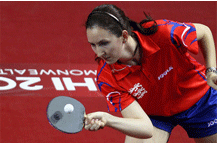During the World Table Tennis Championships in Rotterdam, I had the pleasure of speaking to Jean-Michel Saive; a player I grew up watching (I saw him win the European championships in Birmingham, England) and respecting (he was awarded the UNESCO World Award of Fair Play in 1989).
These World Championships were particularly significant for Jean-Michel Saive. Competing in his 20th World Table Tennis Championships, Saive broke Victor Barna’s previous world record of 19 participations.

- How old were you when you started playing table tennis?
I was nearly 9. I started together with my brother [Philippe Saive], because our parents were players. My father was number 10 in Belgium the year my brother was born. My mother was Belgium champion in the ‘B’ category [around 30-50 in Belgium] and she won that when she was pregnant with me. - You didn’t start playing until you were 9 even though your parents were so heavily involved in table tennis?
No, I played my first tournament October 1978 and my birthday is November. So before I had played a little bit in the club, I think a little bit on the kitchen table and the living room table.
First 2 or 3 tournaments it was really funny. After the third one I won and then it was very fast. - When you started out, right at the very beginning, what were your goals?
My goal was to be under 11 Belgium Champion because I was one of the best. After playing for one and a half years I lost in the final of the Belgium Closed under 11 when I was 10. When I was 11 I won, and then I never lost. All cadet, all junior, I won them all. - How did you make becoming a top table tennis player happen?
I don’t know. I just did it step by step, so I wanted to be Belgium Champion under 11 and then Belgium Champion cadet.
Then when I played in the European Championships, in the second to last year of the cadets, I knew I was number 2 in the ranking. There was only one guy I knew I should beat, but the guy was already European cadet Champion, so it was not easy to close the gap. I went to play in Germany in the second division Bundesliga with TTC Julich. Then after 1 year I won (European Cadet Championships).
The following step was to be senior Belgium Champion, so I became Belgium Champion by 15, so it was step-by-step. - Would it be fair to say that all the way through your career you’ve set yourself ‘little’ targets?
Achievable targets, not like when I was 11 I said on TV, “I want to be maybe one day European Champion”. - Which you made happen in 1994 in Birmingham, England.
I should have said World Champion or Olympic Champion and maybe I would have made it. - Did you have to make any sacrifices?
Of course. When you go to school it is a tough period. You don’t have friends, everything is for table tennis. But, if you really love it and if you really like it, you don’t feel like it is a sacrifice.
When you are, let’s say between 16 and 19 or 20, it is tough for some players. When you’ve finished been a junior, ok now the guys have the under 21’s and they are lucky to have this category, but in my time it was junior and then automatically senior. You are, let’s say, a king in your own country and then you are maybe king in Europe in the juniors and then you go into the seniors and you are nobody. It is tough, because you are nobody and your friends go to school, study to be Engineers or whatever and they go out and they go to parties and you have to be focused on your sport. This period is tough. - I get the impression you don’t have any longtime friends from when you are younger?
I still have some friends that I see. They first came to see me play in 1985 in the Belgium Closed, we were at school together. The period when I was really at the top in the 90’s they came with lots of friends, like 20. They were a group and they were there chanting and screaming when Belgium was playing European League or Charleroi in the European Cup. So, I didn’t see them a lot, but I still have contact with them. - Is there a particular obstacle that stands out in your mind that you had to overcome? …How did you overcome it?
There are many obstacles in Belgium. When I was playing, there were no professional halls. My club where I started to play was on stone, so for your knees and your body it was terrible. It was not professional, so when you see how the Chinese are structured it is amazing a small guy from Belgium could pass and beat them. I mean, in the beginning until I was European Champion cadet I had no professional coach. I had some guys who helped me, but this was without exercises. I went to play and mostly played matches. I did a bit of physical [exercise], but not multi-ball like it is now. It is just because I wanted to win so much that I overcame all this.
They made a specific hall in Belgium in 1996 after I was the number 1 in the World. This hall is named after me, but now this hall has become a fitness hall and no longer a table tennis hall even though I am still playing. - How do you continue to motivate yourself?
Well, I still like playing, I still like to try, I still like to sweat. I think in table tennis we have the luck that this is a game and it is always different. You know, you don’t always go against the clock, against the time that you have to do 100 metres in 11 seconds. It makes it easier if you like to have fun in games, maybe you stay younger also. - How have you managed to maintain your consistency and continue to play at the high level you do?
Well, first you have to listen to your body and be clever. Not go too far and have these big injuries. On the other side, you have to adapt your practice because when you are 40, it is not the same as when you are 20.
When you get older, the practice is even more specific and even more individual. If the guys say practice 2 times a day 5 times a week, I have to play maybe once a day. I cannot follow the training camp like them, otherwise I might get injured. - Was the 1994 European Championships the most important title you won?
Because this is what the people remember, to win the Europeans, the Worlds or the Olympics. But for me it was more important a month before to win the European Top 12s. Because I lost in 1992 in this European Championships against Rosskopf and then I lost in the final in 1993 against Gatien. I knew before the final with Waldner in the top 12 1994 that I would become the number 1 in the World if I won the tournament. So, for me it was like one-step higher, not to be a winner and not to be a loser of big tournament. To be a winner, to become number 1 in the World and then confirm this because some people say at that time, “Yeah, he won nothing he just won Top 12”. It is like Wozniacki in tennis today, she is number 1, but she hasn’t won a grand slam so everybody wait until she has won a grand slam to say, “ok, she is the number 1”. I was a little bit in this situation, so of course winning the Europeans against Waldner, that time he didn’t win the Europeans so it was very big for him too, I mean, it is amazing. To beat the biggest player in the history of table tennis in the final of the Europeans. It is like you beat Nadal at Roland Garros today. - What does it feel like to win a competition like that?
The biggest emotion for me, as I said was in the European Top 12. When I won that match, as I said I was always growing-up step-by-step like 100 in the World ranking then 50, 30, 20 and then when I won this tournament and to become number 1 I, I couldn’t breathe. I went to the dressing room, I felt like I would die, from the emotion it was so, so big because after number 1 you can only go down. It’s tough. It is also mentally very tough after because everybody expects you to win all the time, everything, which is not possible. You are number 1 and you build your career to the next goal and then to improve and to improve, then when you are number 1 you cannot improve. You cannot be 0, it is a crazy feeling, a crazy, crazy feeling. Very, very strange and you are very young and you achieve this big goal and you are 24. You say, “Wow, wow, wow, wow, I still have 50, 60 years to live. What will I do?” - So there is a lot of fear?
Yeah, it is strange. You are so proud and at the same time afraid. You can’t sleep. It is a very strange feeling. - What does table tennis mean to you today?
It depends. It depends which kind of competition I have to play: sometimes fun, sometimes my job. - It feels like a job then?
Sometimes, yes. If I have to play Belgian League for example, it is really a job. It is very boring for me. In Belgium you have to play 7 matches even if you lead 4-0 you have to play 5, 6 and 7. These three matches for me are totally boring, my motivation is under zero. - Why do you play in Belgium then?
Because we have one of the greatest clubs in the history of table tennis. With Charleroi we’ve won the Champions League 5 times and the European Club Cup of Champions 2 times.
Champions League is great. We play in big halls with a lot of spectators, or we had a lot of spectators, now it is less. - Finally, finish this sentence, “In the future, I …”
In the future I, I, I don’t know. In the future I don’t know what will happen. I cannot say what will happen in the future. I hope I will have as much pleasure as I have had over the last 40 years.
Please check this link for more details.




